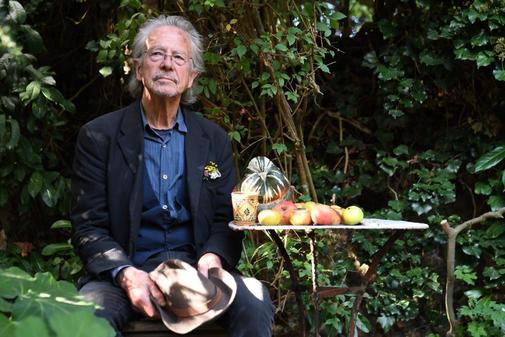- Profile.The irritating loner
- Controversy: Hanke renounces the Ibsen prize money for his stance in the Balkan war
- Winner: Peter Handke and Olga Tokarczuk win double Nobel Prize for Literature
- Interview. "The Catalonia project is scary"
- Balkans: an open wound next to Europe
The main association of victims of the genocide in the Bosnian city of Srebrenica in 1995 announced today that it will request the withdrawal of the Nobel Prize for Literature from Peter Handke, accusing him of defending those responsible for war crimes .
Munira Subasic, president of the Mothers of Srebrenica association, told Klix the Bosnian portal that the petition will be sent to the Nobel Committee .
"The man who defended the Balkan butchers cannot get that prize," Subasic said.
"We are very affected as victims . How can someone who defends criminals and, above all, those who committed the genocide get the Nobel Prize?" He said.
In Srebrenica, Serbo-Bosnian militias murdered 8,000 Muslim men in 1995 during the war in Bosnia, an act that international justice has described as genocide.
Handke's proserbia position has reopened old wounds in the Western Balkans, a territory still traumatized by the consequences of the disintegration wars of the former Yugoslavia.
For some, Handke is an apologist for crimes committed in the name of Serbian nationalism, while for others he is an intellectual who dared to fight against the demonization of Serbs as the cause of all the evils of wars in the former Yugoslavia.
Sefik Dzaferovic, a Muslim member of the Bosnian tripartite presidency, also considered it a shame to reward Handke, who he described as an admirer of the authoritarian former Serbian president Slobodan Milosevic (1941-2006).
"It is shameful that the Nobel Committee overlooks the fact that Handke justified and defended Slobodan Milosevic and his executors Radovan Karadzic and Ratko Mladic, who were convicted of the most serious war crimes, including genocide," Dzaferovic said.
Also the president of Kosovo, Hashim Thaci, has criticized the awarding of the prize to Handke.
"The genocide in Bosnia-Herzegovina had an author. Handke chose to support and defend those authors. The decision about the Nobel Prize has brought immense pain to the countless victims, " Thaci wrote on Twitter.
Albanian Prime Minister Edi Rama wrote on the same social network: "I never thought I would feel like throwing up for a Nobel Prize , but shamelessness is becoming a normal part of the world we live in."
"NO, we cannot be so insensitive to racism and genocide!" Added the head of government.
"Joy in Serbia"
Numerous intellectuals from Bosnia, Kosovo and Albania have criticized the decision by calling Handke apologetic and denial of crimes committed in the name of Serbian nationalism.
On the Change.org online petition platform, some 12,000 signatures have already been collected to demand the withdrawal of Nobel from Handke for being an admirer of Milosevic, the "butcher of the Balkans."
In Serbia, where Handke is widely recognized and awarded, the award has been received with joy.
The Minister of Culture, Vladan Vukosavljevic, stressed that the writer was with "the Serbian people" in his most difficult moments.
Serbian filmmaker Emir Kusturica also celebrated the award and said that "political struggle (of Handke) has been the continuation of his literature."
Since he published in 1996 A winter trip to the Danube, Sava, Morava and Drina rivers, or justice for Serbia the controversy for his political positions has always accompanied him.
Critics have considered this chronicle of his trip to the Balkans a proserbian pamphlet and some argue that he comes to question the Srebrenica genocide.
Handke denied that he questioned or minimized that massacre and said he intended only to clarify the Manichean image offered in the international press that the Serbs were "evil" and Bosni-Muslim "good."
During the NATO bombings in 1999 against the then Yugoslavia - justified by the excesses in Kosovo - Handke said the Alliance intended to create "a new Auschwitz" , referring to the Holocaust developed by Nazi Germany. Handke later apologized for using that expression.
The controversy grew years later with his defense of authoritarian Milosevic, whom he even visited in his prison in The Hague in 2004 when he was tried as a war criminal and at whose funeral he took the floor in 2006.
Leading Austrian intellectuals such as Noel Elfriede Jelinek and writer Robert Menasse, defended Handke's right to dissent and criticized as censorship attempts to silence him.
For others, such as the late American writer Susan Sontag, who was in Sarajevo during the Serbo-Siege siege, or the Italian Claudio Magris, Handke's position minimized Serbian ultranationalism and its aggressive actions.
According to the criteria of The Trust Project
Know more- culture
- literature
- Nobel Prizes
Literature Peter Handke removes iron from his old idea of "abolishing the Nobel"
LiteratureFive things to know about the Nobel Prize for Literature: from Salman Rushdie's case to gifts to academics
LiteraturaSvetlana Alexiévich: "Contemporary man is out of thread"

